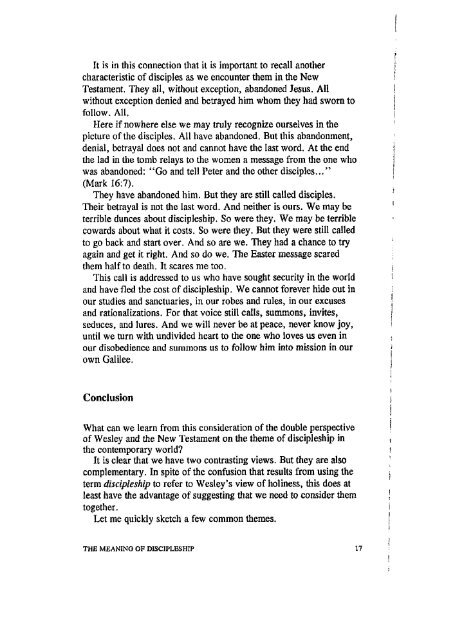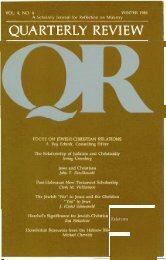TJieodore W. Jennings, Jr. The Meaning of ... - Quarterly Review
TJieodore W. Jennings, Jr. The Meaning of ... - Quarterly Review
TJieodore W. Jennings, Jr. The Meaning of ... - Quarterly Review
Create successful ePaper yourself
Turn your PDF publications into a flip-book with our unique Google optimized e-Paper software.
It is in this connection that it is important to recall another<br />
characteristic <strong>of</strong> disciples as we encounter them in the New<br />
Testament. <strong>The</strong>y all, without exception, abandoned Jesus. All<br />
without exception denied and betrayed him whom they had sworn to<br />
follow. All.<br />
Here if nowhere else we may truly recognize ourselves in the<br />
picture <strong>of</strong> the disciples. All have abandoned. But this abandonment,<br />
denial, betrayal does not and cannot have the last word. At the end<br />
the lad in the tomb relays to the women a message from the one who<br />
was abandoned: "Go and tell Peter and the other disciples..."<br />
(Mark 16:7).<br />
<strong>The</strong>y have abandoned him. But they are still called disciples.<br />
<strong>The</strong>ir betrayal is not the last word. And neither is ours. We may be<br />
terrible dunces about discipleship. So were they. We may be terrible<br />
cowards about what it costs. So were they. But they were still called<br />
to go back and start over. And so are we. <strong>The</strong>y had a chance to try<br />
again and get it right. And so do we. <strong>The</strong> Easter message scared<br />
them half to death. It scares me too.<br />
This call is addressed to us who have sought security in the world<br />
and have fled the cost <strong>of</strong> discipleship. We cannot forever hide out in<br />
our studies and sanctuaries, in our robes and rules, in our excuses<br />
and rationalizations. For that voice still calls, summons, invites,<br />
seduces, and lures. And we will never be at peace, never know joy,<br />
until we turn with undivided heart to the one who loves us even in<br />
our disobedience and summons us to follow him into mission in our<br />
own Galilee.<br />
Conclusion<br />
What can we learn from this consideration <strong>of</strong> the double perspective<br />
<strong>of</strong> Wesley and the New Testament on the theme <strong>of</strong> discipleship in<br />
the contemporary world?<br />
It is clear that we have two contrasting views. But they are also<br />
complementary. In spite <strong>of</strong> the confusion that results from using the<br />
term discipleship to refer to Wesley's view <strong>of</strong> holiness, this does at<br />
least have the advantage <strong>of</strong> suggesting that we need to consider them<br />
together.<br />
Let me quickly sketch a few common themes.<br />
THE MEANING OF DISCIPLESHIP 17












